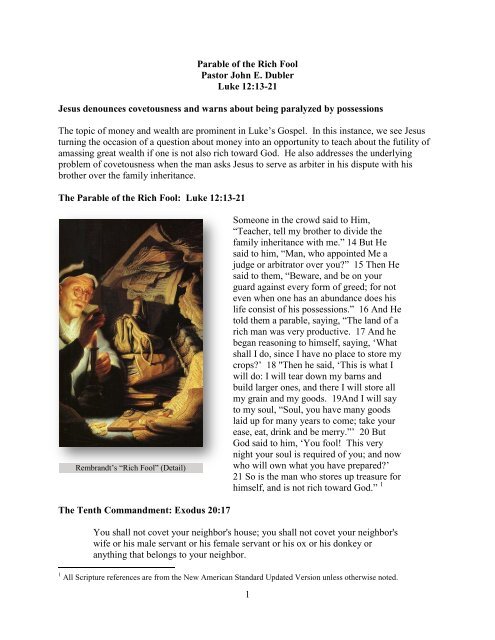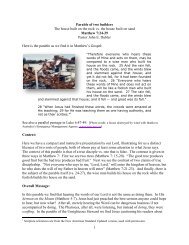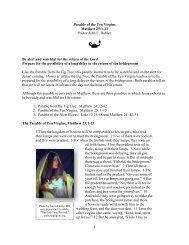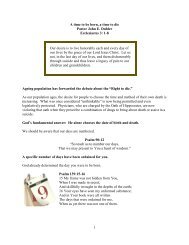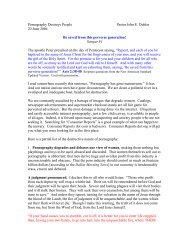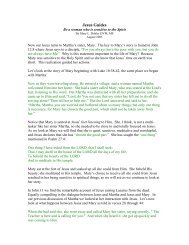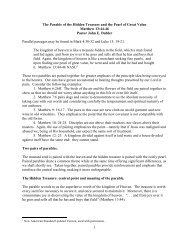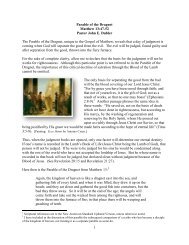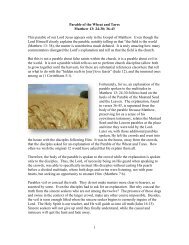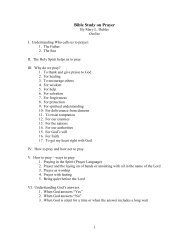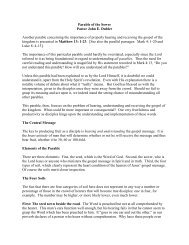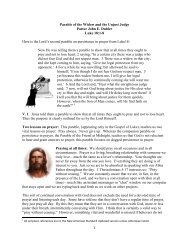1 Parable of the Rich Fool Pastor John E. Dubler Luke 12:13-21 ...
1 Parable of the Rich Fool Pastor John E. Dubler Luke 12:13-21 ...
1 Parable of the Rich Fool Pastor John E. Dubler Luke 12:13-21 ...
You also want an ePaper? Increase the reach of your titles
YUMPU automatically turns print PDFs into web optimized ePapers that Google loves.
<strong>Parable</strong> <strong>of</strong> <strong>the</strong> <strong>Rich</strong> <strong>Fool</strong><br />
<strong>Pastor</strong> <strong>John</strong> E. <strong>Dubler</strong><br />
<strong>Luke</strong> <strong>12</strong>:<strong>13</strong>-<strong>21</strong><br />
Jesus denounces covetousness and warns about being paralyzed by possessions<br />
The topic <strong>of</strong> money and wealth are prominent in <strong>Luke</strong>‘s Gospel. In this instance, we see Jesus<br />
turning <strong>the</strong> occasion <strong>of</strong> a question about money into an opportunity to teach about <strong>the</strong> futility <strong>of</strong><br />
amassing great wealth if one is not also rich toward God. He also addresses <strong>the</strong> underlying<br />
problem <strong>of</strong> covetousness when <strong>the</strong> man asks Jesus to serve as arbiter in his dispute with his<br />
bro<strong>the</strong>r over <strong>the</strong> family inheritance.<br />
The <strong>Parable</strong> <strong>of</strong> <strong>the</strong> <strong>Rich</strong> <strong>Fool</strong>: <strong>Luke</strong> <strong>12</strong>:<strong>13</strong>-<strong>21</strong><br />
Rembrandt‘s ―<strong>Rich</strong> <strong>Fool</strong>‖ (Detail)<br />
The Tenth Commandment: Exodus 20:17<br />
Someone in <strong>the</strong> crowd said to Him,<br />
―Teacher, tell my bro<strong>the</strong>r to divide <strong>the</strong><br />
family inheritance with me.‖ 14 But He<br />
said to him, ―Man, who appointed Me a<br />
judge or arbitrator over you?‖ 15 Then He<br />
said to <strong>the</strong>m, ―Beware, and be on your<br />
guard against every form <strong>of</strong> greed; for not<br />
even when one has an abundance does his<br />
life consist <strong>of</strong> his possessions.‖ 16 And He<br />
told <strong>the</strong>m a parable, saying, ―The land <strong>of</strong> a<br />
rich man was very productive. 17 And he<br />
began reasoning to himself, saying, ‗What<br />
shall I do, since I have no place to store my<br />
crops?‘ 18 "Then he said, ‗This is what I<br />
will do: I will tear down my barns and<br />
build larger ones, and <strong>the</strong>re I will store all<br />
my grain and my goods. 19And I will say<br />
to my soul, ―Soul, you have many goods<br />
laid up for many years to come; take your<br />
ease, eat, drink and be merry.‖‘ 20 But<br />
God said to him, ‗You fool! This very<br />
night your soul is required <strong>of</strong> you; and now<br />
who will own what you have prepared?‘<br />
<strong>21</strong> So is <strong>the</strong> man who stores up treasure for<br />
himself, and is not rich toward God.‖ 1<br />
You shall not covet your neighbor's house; you shall not covet your neighbor's<br />
wife or his male servant or his female servant or his ox or his donkey or<br />
anything that belongs to your neighbor.<br />
1 All Scripture references are from <strong>the</strong> New American Standard Updated Version unless o<strong>the</strong>rwise noted.<br />
1
The Rabbi consulted on a question <strong>of</strong> money and ethics<br />
Somebody in <strong>the</strong> crowd who recognized Jesus as a Rabbi<br />
asks Him to render a judgment regarding possessions. It<br />
was not uncommon for Rabbis to be consulted about<br />
decisions <strong>of</strong> judgment, and historically Rabbis performed<br />
<strong>the</strong> function <strong>of</strong> itinerant judge, traveling from place to<br />
place to render judgment in civil disputes and o<strong>the</strong>r legal<br />
matters. [Photo from christslave.org]<br />
Divide <strong>the</strong> inheritance<br />
We are not given any detail about <strong>the</strong> case at hand.<br />
Indeed, Jesus probably would not have permitted <strong>the</strong><br />
questioner to share detail even if he had tried. The man<br />
wants Jesus to order his bro<strong>the</strong>r to share <strong>the</strong> family<br />
inheritance with him. Inquiring minds can only make<br />
assumptions at this point. Perhaps <strong>the</strong> elder bro<strong>the</strong>r (who<br />
would have been entitled <strong>the</strong> entire estate including <strong>the</strong><br />
birthright and blessing from his fa<strong>the</strong>r along with <strong>the</strong> responsibility <strong>of</strong> caring for <strong>the</strong> family as <strong>the</strong><br />
fa<strong>the</strong>r would have done) was somehow charged by his parents to share some <strong>of</strong> <strong>the</strong> estate and<br />
was not doing so. In whatever case may be imagined, <strong>the</strong> outcome <strong>of</strong> <strong>the</strong> answer is not<br />
predicated on <strong>the</strong> injustice <strong>of</strong> <strong>the</strong> case whe<strong>the</strong>r perceived or real.<br />
Jesus identifies <strong>the</strong> underlying problem<br />
Solving <strong>the</strong> ―presenting‖ problem or surface issue (what <strong>the</strong> man complains about) would not<br />
have solved <strong>the</strong> root problem in this case—or in any o<strong>the</strong>r case for that matter. It is a wise<br />
counselor who will listen to <strong>the</strong> surface problem with one ear while listening to <strong>the</strong> Lord with <strong>the</strong><br />
o<strong>the</strong>r to determine <strong>the</strong> underlying or root problem. The surface problem in this case is a question<br />
about <strong>the</strong> inheritance; <strong>the</strong> root problem is greed.<br />
Jesus unwilling to preside over a family dispute<br />
―Man, who appointed me a judge or arbiter over you?‖ Jesus responds.<br />
He is unwilling to sort through <strong>the</strong> details <strong>of</strong> a family dispute over money<br />
precisely because <strong>the</strong> family quarrel is not <strong>the</strong> real issue. The condition<br />
<strong>of</strong> man‘s heart is at <strong>the</strong> root here, and Jesus delivers a sharp warning<br />
without entering into judgment over <strong>the</strong> specifics. This is consistent with<br />
Jesus‘ overall mission to come first with <strong>the</strong> salvation message <strong>of</strong> grace<br />
and forgiveness. His second coming will be with judgment and fire. In <strong>the</strong> inauguration <strong>of</strong> His<br />
public ministry Jesus was at Nazareth in <strong>the</strong> synagogue. They handed Him <strong>the</strong> Isaiah scroll and<br />
listened while Jesus read, [Image from covlife.org]<br />
2
The Spirit <strong>of</strong> <strong>the</strong> Lord GOD is upon me,<br />
Because <strong>the</strong> LORD has anointed me<br />
To bring good news to <strong>the</strong> afflicted;<br />
He has sent me to bind up <strong>the</strong> brokenhearted,<br />
To proclaim liberty to captives<br />
And freedom to prisoners;<br />
To proclaim <strong>the</strong> favorable year <strong>of</strong> <strong>the</strong> LORD<br />
Isaiah 61:1-2 and <strong>Luke</strong> 4:18-19<br />
There He stopped in mid-sentence. He did not read <strong>the</strong> very next line: ―And <strong>the</strong> day <strong>of</strong><br />
vengeance <strong>of</strong> our God.‖ 2<br />
The Gospels confirm that Jesus‘ first coming was to proclaim forgiveness and not judgment:<br />
And again:<br />
For God did not send <strong>the</strong> Son into <strong>the</strong> world to judge <strong>the</strong> world, but that <strong>the</strong><br />
world might be saved through Him. <strong>John</strong> 3:17<br />
If anyone hears My sayings and does not keep <strong>the</strong>m, I do not judge him; for I<br />
did not come to judge <strong>the</strong> world, but to save <strong>the</strong> world. He who rejects Me and<br />
does not receive My sayings, has one who judges him; <strong>the</strong> word I spoke is<br />
what will judge him at <strong>the</strong> last day. <strong>John</strong> <strong>12</strong>:47-48<br />
Real life is not about possessions<br />
The issue at hand is not inheritance but what is <strong>the</strong> consistency or nature <strong>of</strong> real life. Jesus tells<br />
<strong>the</strong> <strong>of</strong>fended bro<strong>the</strong>r, ―Beware, and be on your guard against every form <strong>of</strong> greed; for not even<br />
when one has an abundance does his life consist <strong>of</strong> his possessions.‖ Looking at <strong>the</strong> second part<br />
<strong>of</strong> His statement first, we find that ―life‖ (Greek ξωή–zoe) is not<br />
defined by possessions. Real life does not consist <strong>of</strong> possessions<br />
and things. Earthly life must be lived with a view toward<br />
eternity, where possessions are <strong>of</strong> no consequence whatever.<br />
2 Isaiah 6:2<br />
Covetousness is idolatry, according to Exodus 20. Therefore<br />
exalting possessions and things above <strong>the</strong>ir rightful and useful<br />
place is not real living. In fact, working for possessions and<br />
miserly hoarding <strong>the</strong>m is roundly condemned in Scripture as both<br />
unwise and idolatrous.<br />
Isaiah 55:2<br />
Why do you spend money for what is not bread,<br />
And your wages for what does not satisfy?<br />
3
Beware and be on guard against every form <strong>of</strong> greed<br />
The first part <strong>of</strong> Jesus‘ warning about material possessions is a caution to ―beware and be on<br />
your guard against every form <strong>of</strong> greed.‖<br />
The phrase ―be on guard,‖ or ―be on your guard‖ is not commonly used in <strong>the</strong> New Testament.<br />
Therefore <strong>the</strong> times <strong>the</strong> phrase appears captures our attention. We are to be on guard concerning:<br />
Being handed over to <strong>the</strong> courts (Mark <strong>13</strong>:9)<br />
Greed (<strong>Luke</strong> <strong>12</strong>:15)<br />
If your bro<strong>the</strong>r sins (<strong>Luke</strong> 17:3)<br />
Dissipation, drunkenness and worry (<strong>Luke</strong> <strong>21</strong>:34)<br />
The errors <strong>of</strong> unprincipled men (2 Peter 3:17)<br />
Jesus notes in this statement <strong>of</strong> warning that we may encounter more than one form <strong>of</strong> greed in<br />
saying, ―Beware and be on your guard against every form <strong>of</strong> greed.‖ He seems to imply that<br />
greed could take forms we have not expected, going beyond what we have heard in <strong>the</strong> Tenth<br />
Commandment which lists things belonging to our neighbor:<br />
House<br />
Wife<br />
Male Servant<br />
Female Servant<br />
Ox<br />
Donkey<br />
Or anything that is your neighbor‘s<br />
The ―every form <strong>of</strong> greed‖ statement leaves plenty <strong>of</strong> room<br />
for variants on an old <strong>the</strong>me. Our consumer culture with its<br />
powerful advertising machine actually encourages many<br />
forms <strong>of</strong> greed which can make us think that real life means<br />
an abundance <strong>of</strong> things. [Mammoth Jack Mules in Lancaster, PA.,<br />
by <strong>the</strong> author]<br />
In <strong>the</strong> parable which follows Jesus‘ warning, a person who<br />
falls for <strong>the</strong> possessions trap is described as a ―fool.‖ This is<br />
not a slap on <strong>the</strong> wrist, but a term which describes one who<br />
has rejected <strong>the</strong> ways <strong>of</strong> God and adopted <strong>the</strong> ways <strong>of</strong> <strong>the</strong><br />
world. The fool rejects <strong>the</strong> wisdom <strong>of</strong> God and embraces <strong>the</strong><br />
way <strong>of</strong> <strong>the</strong> world, resulting in death.<br />
Focus on possessions can cause anxiety<br />
Context is always revealing, and this case is no exception.<br />
By reading past <strong>the</strong> immediate passage we find that overattention<br />
to possessions (whe<strong>the</strong>r abundance or lack) results<br />
in anxiety. Turning to His disciples after giving <strong>the</strong> <strong>Parable</strong> <strong>of</strong> <strong>the</strong> <strong>Rich</strong> <strong>Fool</strong>, Jesus says, ―For<br />
4
this reason I say to you, do not worry about your life, as to what you will eat; nor for your body,<br />
as to what you will put on. For life is more than food, and <strong>the</strong> body more than clothing.‖ 3<br />
The parable <strong>of</strong> <strong>the</strong> <strong>Rich</strong> <strong>Fool</strong> illustrates Jesus’ point concerning life and possessions.<br />
Elements <strong>of</strong> <strong>the</strong> parable:<br />
The Piedmont near Turin, Italy—very productive land<br />
Keep deception and lies far from me,<br />
Give me nei<strong>the</strong>r poverty nor riches;<br />
Feed me with <strong>the</strong> food that is my portion<br />
5<br />
1. The Land. ―The land <strong>of</strong> a rich man was<br />
very productive.‖ Here we may substitute<br />
―job‖ or ―work‖ if we like for ―land.‖<br />
Whatever we are doing, especially as we<br />
follow <strong>the</strong> Lord, may become very productive<br />
indeed. Following God‘s ways may bring<br />
prosperity. Having money and wealth is a<br />
mixed blessing. We are spared depravation<br />
and want, but we have added responsibilities.<br />
Therefore in Proverbs 30 we find this<br />
instruction:<br />
That I not be full and deny You and say, "Who is <strong>the</strong> LORD?"<br />
Or that I not be in want and steal,<br />
And pr<strong>of</strong>ane <strong>the</strong> name <strong>of</strong> my God. 4<br />
It may be worth asking ourselves if we can honestly pray ―give me nei<strong>the</strong>r poverty nor riches.‖<br />
Wealth is a great deceiver, and its chief deception is that it promises happiness. We should all<br />
know by now that its promise <strong>of</strong> happiness is entirely vacant.<br />
But concerning our job (or our land), we are fur<strong>the</strong>r warned in Deuteronomy that when we<br />
prosper we must not forget God:<br />
Then it shall come about when <strong>the</strong> LORD your God brings you into <strong>the</strong> land<br />
which He swore to your fa<strong>the</strong>rs, Abraham, Isaac and Jacob, to give you, great<br />
and splendid cities which you did not build, and houses full <strong>of</strong> all good things<br />
which you did not fill, and hewn cisterns which you did not dig, vineyards and<br />
olive trees which you did not plant, and you eat and are satisfied, <strong>the</strong>n watch<br />
yourself, that you do not forget <strong>the</strong> LORD who brought you from <strong>the</strong> land <strong>of</strong><br />
Egypt, out <strong>of</strong> <strong>the</strong> house <strong>of</strong> slavery. 5<br />
3 <strong>Luke</strong> <strong>12</strong>:22-23<br />
4 Proverbs 30:8-9<br />
5 Deuteronomy 6:10-<strong>12</strong>
2. A man who takes his own advice.<br />
Here is an interesting conversation which <strong>the</strong> rich man has with himself. Let‘s listen more<br />
closely to <strong>the</strong> elements <strong>of</strong> <strong>the</strong> conversation.<br />
a. ―And he began reasoning to himself, saying . . .‖ We always get in trouble when we<br />
begin reasoning to ourselves. The conversation this man needed to have was not with himself<br />
but with God. Take counsel <strong>of</strong> <strong>the</strong> Most High, for He alone<br />
does wonders, He alone knows <strong>the</strong> future, He alone gave<br />
you prosperity in <strong>the</strong> first place, and He alone should be <strong>the</strong><br />
One to determine how you dispose <strong>of</strong> what He has given<br />
you.<br />
b. ―What shall I do, since I have no place to store my<br />
crops?‖ Prosperity brings <strong>the</strong> problems <strong>of</strong> storage and<br />
disposal. The man‘s crop that year was so large that it<br />
exceeded storage capacity. This is a familiar problem for<br />
wheat and corn growers in <strong>the</strong> United States. A wise<br />
individual and a wise nation will seek to honor God with <strong>the</strong> abundance.<br />
However, we may not always have an abundance <strong>of</strong> grain world-wide. In 2007 <strong>the</strong> United States<br />
planted more acres <strong>of</strong> corn than at any time since WWII. The <strong>12</strong>-<strong>13</strong> billion bushel harvest this<br />
year will far exceed available storage. Yet, it is projected that in 2008 <strong>the</strong> world will again<br />
consume more grain than it produces for <strong>the</strong> third year in a row. World gain stockpiles are now<br />
at only 56 days supply. We should be praying for wisdom for our grain producers. Without<br />
God‘s intervention, food shortages now look inevitable.<br />
c. ―Then he said, ‗This is what I will do: I will tear down my<br />
barns and build larger ones, and <strong>the</strong>re I will store all my grain and<br />
my goods.‖ An observant learner will certainly find wisdom by<br />
learning from <strong>the</strong> rich fool‘s error. Let us not follow <strong>the</strong> path <strong>of</strong> this<br />
foolish man. His conclusion about <strong>the</strong> problem <strong>of</strong> accumulated<br />
wealth was that storage capacity was inadequate. The opposite was<br />
true. He had plenty <strong>of</strong> <strong>of</strong>f-site storage capacity. He could have<br />
blessed many o<strong>the</strong>rs with <strong>the</strong> wealth God had given him. Instead he<br />
chose to hoard. A little quiet time with <strong>the</strong> Lord <strong>of</strong> all <strong>the</strong> earth will<br />
quickly reveal to us if we are hoarding wealth—and what we should<br />
do instead.<br />
d. ―And I will say to my soul, ‗Soul, you have many goods laid up for many years to<br />
come; take your ease, eat, drink and be merry.‖‘ Now <strong>the</strong> foolish man concludes that his stored<br />
wealth will provide for all his future needs. This is entirely contrary to <strong>the</strong> ways <strong>of</strong> <strong>the</strong> Lord who<br />
alone is our provider. Preparation for <strong>the</strong> future, and even storing up for retirement is not<br />
condemned here, but putting confidence in <strong>the</strong> storage and assuming that tomorrow will be <strong>the</strong><br />
same as today, only better, is <strong>the</strong> problem.<br />
6
Simple storage as a matter <strong>of</strong> preparation for an uncertain future is not condemned in Scripture:<br />
Proverbs <strong>13</strong>:22<br />
A good man leaves an inheritance to his children's children,<br />
And <strong>the</strong> wealth <strong>of</strong> <strong>the</strong> sinner is stored up for <strong>the</strong> righteous.<br />
Proverbs 6:6-8<br />
Go to <strong>the</strong> ant, O sluggard,<br />
Observe her ways and be wise,<br />
Which, having no chief,<br />
Officer or ruler,<br />
Prepares her food in <strong>the</strong> summer<br />
And ga<strong>the</strong>rs her provision in <strong>the</strong> harvest.<br />
In nei<strong>the</strong>r case cited above is <strong>the</strong> presumption that stored wealth will provide years <strong>of</strong> ease and<br />
carefree living for <strong>the</strong> owner.<br />
3. God speaks to <strong>the</strong> foolish man. [Image: Roman coin hoard]<br />
―But God said to him, ‗You fool! This very night your soul<br />
is required <strong>of</strong> you; and now who will own what you have<br />
prepared?‘‖ A final element <strong>of</strong> <strong>the</strong> parable is God Himself,<br />
bringing His evaluation <strong>of</strong> <strong>the</strong> man‘s storage plan into sharp<br />
focus. God will weigh in on our plans. It is much wiser to<br />
have Him evaluate <strong>the</strong> plan before we implement it, and to<br />
follow His ways concerning <strong>the</strong> plan, than to have it<br />
evaluated at our death and we be found wanting.<br />
Proverbs 16:3<br />
Commit your works to <strong>the</strong> LORD<br />
And your plans will be established.<br />
The man will have to leave all his possessions here. Nobody takes anything with him when he<br />
dies. All possessions and wealth remain behind. This truth has long been problematical for men.<br />
Pharaohs have had various possessions, even food, buried with <strong>the</strong>m in <strong>the</strong> pyramid tombs so<br />
that <strong>the</strong> possessions would be available to <strong>the</strong>m in <strong>the</strong> afterlife. The mausoleum <strong>of</strong> <strong>the</strong> First Qin<br />
Emperor contained more than 8,000 terracotta soldiers 6 so he would have an army available to<br />
him in <strong>the</strong> afterlife—certainly a useful concept and rational idea for one who is ignorant <strong>of</strong> what<br />
happens to a man after death.<br />
The Preacher <strong>of</strong> Ecclesiastes emphasizes <strong>the</strong> problem <strong>of</strong> accumulated wealth quite clearly:<br />
6 The life-size figures <strong>of</strong> soldiers and warriors were buried about <strong>21</strong>0 BC. Every soldier is unique with distinctly<br />
different facial features and expressions. Only <strong>the</strong> generals are larger than life at about 6 feet 5in., more than a foot<br />
taller than <strong>the</strong> soldiers <strong>of</strong> <strong>the</strong> day.<br />
7
Thus I hated all <strong>the</strong> fruit <strong>of</strong> my labor for which I had labored under <strong>the</strong> sun, for<br />
I must leave it to <strong>the</strong> man who will come after me. And who knows whe<strong>the</strong>r<br />
he will be a wise man or a fool? Yet he will have control over all <strong>the</strong> fruit <strong>of</strong><br />
my labor for which I have labored by acting wisely under <strong>the</strong> sun. This too is<br />
vanity. 7<br />
Treasure stored up for yourself<br />
In <strong>the</strong> Sermon on <strong>the</strong> Mount Jesus instructs us:<br />
Do not store up for yourselves treasures on earth, where moth and rust destroy,<br />
and where thieves break in and steal. But store up for yourselves treasures in<br />
heaven, where nei<strong>the</strong>r moth nor rust destroys, and where thieves do not break<br />
in or steal; for where your treasure is, <strong>the</strong>re your heart will be also. 8<br />
The same phrase in store up ―for yourself,‖ in <strong>the</strong> Sermon on <strong>the</strong><br />
Mount is used here in <strong>the</strong> <strong>Parable</strong> <strong>of</strong> <strong>the</strong> <strong>Rich</strong> <strong>Fool</strong>. If life is a<br />
matter <strong>of</strong> your own possessions, everything for one‘s self, <strong>the</strong>n<br />
indeed <strong>the</strong> preacher is right, ―this too is vanity.‖ But it need not<br />
be this way. In revealing <strong>the</strong> error <strong>of</strong> <strong>the</strong> rich fool, <strong>the</strong> Lord also<br />
tells us <strong>the</strong> answer to possessions.<br />
<strong>Rich</strong> toward God<br />
The parable concludes with this phrase: ―So is <strong>the</strong> man who<br />
stores up treasure for himself, and is not rich toward God.‖<br />
Possessing riches in <strong>the</strong> world does not mean that <strong>the</strong> owner is<br />
also rich toward God. Indeed <strong>the</strong> probability is <strong>the</strong> exact<br />
opposite. <strong>Rich</strong>es and wealth are great deceivers. They blind <strong>the</strong><br />
eyes <strong>of</strong> <strong>the</strong>ir owners and imbue in <strong>the</strong>m idolatry and greed. The answer is to be rich in a<br />
completely different way—rich toward God. Storing up for ourselves treasures in heaven means<br />
living for <strong>the</strong> Lord instead <strong>of</strong> oneself.<br />
Being rich toward God: A matter <strong>of</strong> focus<br />
In <strong>the</strong> Sermon on <strong>the</strong> Mount Jesus addresses <strong>the</strong> problem <strong>of</strong> having one‘s focus on material<br />
possessions, seeking <strong>the</strong>m instead <strong>of</strong> seeking first God‘s kingdom.<br />
Do not worry <strong>the</strong>n, saying, ―What will we eat?‖ or ―What will we drink?‖ or<br />
―What will we wear for clothing?‖ For <strong>the</strong> Gentiles eagerly seek all <strong>the</strong>se<br />
things; for your heavenly Fa<strong>the</strong>r knows that you need all <strong>the</strong>se things. But<br />
seek first His kingdom and His righteousness, and all <strong>the</strong>se things will be<br />
added to you. Mat<strong>the</strong>w 6:31-33<br />
7 Ecclesiastes 2:18-19<br />
8 Mat<strong>the</strong>w 6:19-<strong>21</strong><br />
8
Clearly, <strong>the</strong>n <strong>the</strong> problem is not one <strong>of</strong> having possessions, but having one‘s focus on <strong>the</strong> Lord<br />
and not acquiring wealth. Contrary to what <strong>the</strong> world preaches about wealth, it does not bring<br />
happiness. There is no great virtue in poverty ei<strong>the</strong>r. That is why <strong>the</strong> Word tells us, ―Give me<br />
nei<strong>the</strong>r poverty nor riches ; Feed me with <strong>the</strong> food that is my portion.‖ 9 Focus is everything. If<br />
we focus on God‘s kingdom, <strong>the</strong>n if wealth follows it will be in perspective, useful to <strong>the</strong> Lord<br />
and His desires. If wealth does not follow, <strong>the</strong>n fine. ―Whe<strong>the</strong>r we live or die, we are <strong>the</strong><br />
Lord's,‖ 10 how much more are we His whe<strong>the</strong>r we are rich or poor.<br />
Proverbs 23:4-5 provides a very good reason why our focus should not be on wealth:<br />
Do not weary yourself to gain wealth,<br />
Cease from your consideration <strong>of</strong> it.<br />
When you set your eyes on it, it is gone.<br />
For wealth certainly makes itself wings<br />
Like an eagle that flies toward <strong>the</strong> heavens.<br />
Solomon had it all. His conclusion? He hated life.<br />
King Solomon<br />
by Barry Moser<br />
Nobody was ever more wealthy than Solomon. No one tried more <strong>of</strong><br />
life‘s work or pleasure to bring himself happiness. He stimulated his<br />
mind with wine, he built houses and planted vineyards. He planted<br />
gardens and parks and all kinds <strong>of</strong> fruit trees. He constructed elaborate<br />
ponds for irrigation and irrigated a forest <strong>of</strong> trees. He had male slaves.<br />
He had female slaves. He had homeborn slaves. He possessed flocks<br />
and herds. He collected silver and gold in abundance. He had <strong>the</strong><br />
treasure <strong>of</strong> kings like none before him. He acquired lands and<br />
provinces. He entertained himself with male singers and female singers.<br />
He had 300 concubines and 700 wives. But <strong>the</strong>y turned his heart away<br />
from God. ―For when Solomon was old, his wives turned his heart<br />
away after o<strong>the</strong>r gods; and his heart was not wholly devoted to <strong>the</strong><br />
LORD his God, as <strong>the</strong> heart <strong>of</strong> David his fa<strong>the</strong>r had been.‖ 11<br />
Solomon refused nothing to his eyes, nor any pleasure to his heart. He tried folly and he tried<br />
wisdom and after trying to please himself with everything under <strong>the</strong> sun he made this conclusion:<br />
9 Proverbs 30:8<br />
10 Romans 14:8<br />
11 1 Kings 11:4<br />
Ecclesiastes 2:17<br />
So I hated life, for <strong>the</strong> work which had been done under <strong>the</strong> sun was grievous<br />
to me; because everything is futility and striving after wind.<br />
9
And that is <strong>the</strong> frustrating fate <strong>of</strong> everyone who stores up treasure for himself and is not rich<br />
toward God.<br />
Are you rich?<br />
Are you rich toward God?<br />
―The land <strong>of</strong> a rich man was very productive . . .‖<br />
Pennsylvania Farmland by <strong>the</strong> author<br />
10


